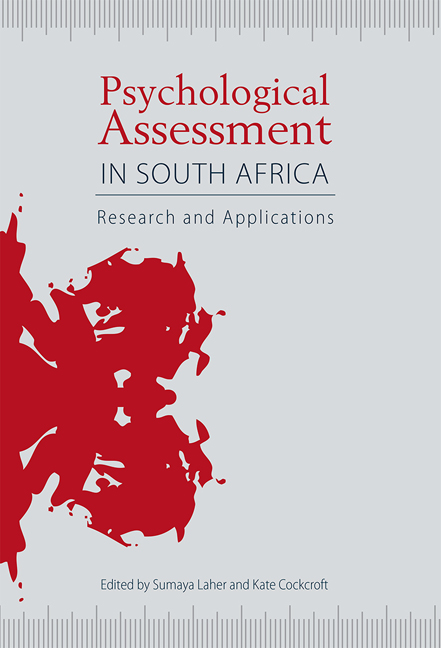Book contents
- Frontmatter
- Contents
- Tables and figures
- Acknowledgements
- Acronyms and abbreviations
- 1 Contextualising psychological assessment in South Africa
- Section One Cognitive tests: conceptual and practical applications
- 2 WAIS-III test performance in the South African context: extension of a prior cross-cultural normative database
- 3 WISC-IV test performance in the South African context: a collation of cross-cultural norms
- 4 The Senior South African Individual Scales – Revised: a review
- 5 Assessing school readiness using the Junior South African Individual Scales: a pathway to resilience
- 6 School readiness assessment in South Africa
- 7 The Kaufman Assessment Battery in South Africa
- 8 The Das-Naglieri Cognitive Assessment System
- 9 Dynamic assessment in South Africa
- 10 The Learning Potential Computerised Adaptive Test in South Africa
- 11 APIL and TRAM learning potential assessment instruments
- 12 The Griffiths Mental Development Scales: an overview and a consideration of their relevance for South Africa
- 13 Neuropsychological assessment in South Africa
- Section Two Personality and projective tests: conceptual and practical applications
- Section Three Assessment approaches and methodologies
- Contributors
- Index
9 - Dynamic assessment in South Africa
from Section One - Cognitive tests: conceptual and practical applications
Published online by Cambridge University Press: 21 April 2018
- Frontmatter
- Contents
- Tables and figures
- Acknowledgements
- Acronyms and abbreviations
- 1 Contextualising psychological assessment in South Africa
- Section One Cognitive tests: conceptual and practical applications
- 2 WAIS-III test performance in the South African context: extension of a prior cross-cultural normative database
- 3 WISC-IV test performance in the South African context: a collation of cross-cultural norms
- 4 The Senior South African Individual Scales – Revised: a review
- 5 Assessing school readiness using the Junior South African Individual Scales: a pathway to resilience
- 6 School readiness assessment in South Africa
- 7 The Kaufman Assessment Battery in South Africa
- 8 The Das-Naglieri Cognitive Assessment System
- 9 Dynamic assessment in South Africa
- 10 The Learning Potential Computerised Adaptive Test in South Africa
- 11 APIL and TRAM learning potential assessment instruments
- 12 The Griffiths Mental Development Scales: an overview and a consideration of their relevance for South Africa
- 13 Neuropsychological assessment in South Africa
- Section Two Personality and projective tests: conceptual and practical applications
- Section Three Assessment approaches and methodologies
- Contributors
- Index
Summary
This chapter outlines current developments in relation to dynamic assessment (DA), an interactive assessment procedure that uses deliberate and planned mediational teaching and assesses the impact of that teaching on subsequent performance. The objective of the chapter is to critically review the major criticisms of the traditional ‘static’ testing approach, discuss the theoretical basis of the DA approach and its relevance within the South African context, and present an overview of current empirical research on DA.
There has been an increased demand worldwide for nondiscriminatory assessment procedures (Haywood & Tzuriel, 1992; Hessels & Hessels-Schlatter, 2002; Nell, 2000; Seabi & Amod, 2009; Skuy, Gewer, Osrin, Khunou, Fridjhon & Rushton, 2002; Tzuriel & Kaufman, 1999). The major criticism regarding the use of standardised intelligence tests is that they primarily reflect Eurocentric, middleclass values and attitudes (Nell, 2000). It is argued that they do not accommodate diversity in relation to culture, language, values, experiential background and cognitive styles. Given the political, socio-economic and educational conditions that have prevailed in South Africa under the apartheid regime and as an effect of its legacy, the application of traditional assessment procedures may be unfair to certain groups of people. Alternative, more equitable forms of assessment such as the DA approach have been proposed by several theorists and researchers for use within the multilingual and multicultural South African context (Amod, 2003; De Beer, 2005; Fairon, 2007; Floquet, 2008; Gewer, 1998; Lipson, 1992; Murphy & Maree, 2006; Seabi & Amod, 2009; Skuy et al., 2002).
A further criticism directed at the use of traditional intelligence tests/ psychometric evaluations is that the scores are derived from a ‘static’ testing situation which provides minimal information regarding the individual's learning potential or potential to respond to intervention. ‘Static’ testing refers to the administration of tests in a standardised manner as stipulated in test manuals. Intervention which could include feedback, training and teaching is refrained from in the traditional static testing approach (Hessels-Schlatter & Hessels, 2009). The limitation of this approach is that the knowledge and skills needed to fulfil the requirements of tests have not necessarily been taught to the child, and this will undoubtedly limit his or her ability to perform well on these tests. In essence, the emphasis in DA is on intra-individual change rather than inter-individual difference.
- Type
- Chapter
- Information
- Psychological Assessment in South AfricaResearch and Applications, pp. 120 - 136Publisher: Wits University PressPrint publication year: 2013

